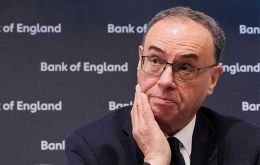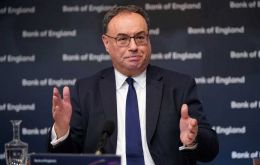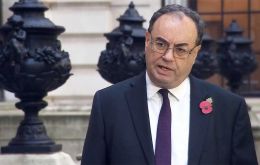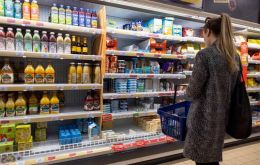MercoPress. South Atlantic News Agency
Tag: UK inflation
-
Thursday, November 20th 2025 - 18:37 UTC
UK inflation down to 3.6% in October; Autumn Budget to be announced next week

UK’s twelve-month inflation rate slid to 3.6% in October, down from 3.8% in September, and a major achievement ahead of the government’s Autumn Budget next week, according to the Office for National Statistics. Core inflation, excluding energy, food, alcohol and tobacco, rose by 3.4% in the year to October, down from 3.5% in September.
-
Thursday, August 21st 2025 - 10:36 UTC
Stubborn inflation in UK, 3.8% in twelve months to July with air fares, fuel and food prices leading

The U.K.’s annual inflation rate was higher than expected at 3.8% in July, according to data released by the Office for National Statistics (ONS) on Wednesday. Most economists had anticipated inflation would reach 3.7% in the twelve months to July, after it picked up to 3.6% in June, exceeding forecasts.
-
Tuesday, July 15th 2025 - 06:39 UTC
Bank of England ready to make larger interest rate cuts if UK economy shows signs of slowing down

The Bank of England is prepared to make larger interest rate cuts if the job market shows signs of slowing down, Governor Andrew Bailey told The Times in an interview. “I really do believe the path is downward” on interest rates, Mr Bailey was quoted..
-
Wednesday, February 19th 2025 - 15:02 UTC
UK January inflation climbs to 3%; Bank of England anticipates ‘bumpy road’ ahead

The UK rate of inflation reached 3% in January, from 2.5% in December, higher than forecasts and with the Bank of England anticipating a “bumpy road” ahead. Forecasts are that it will hit 3.7% later in the year and moving even further away from the Bank's 2% target.
-
Sunday, February 9th 2025 - 19:04 UTC
BoE cuts rate to 4.50% but slashed UK growth to 0.75% and ups inflation estimate to 3.5%

The Bank of England last Thursday cut interest rates 25 percentage points to 4,50%, but at the same time slashed its growth forecast for the year and warned the near-term outlook for the economy had become complicated.
-
Sunday, November 5th 2023 - 10:23 UTC
UK economy on flat growth track, with decreasing inflation, BoE report

The UK economy is on flat growth for a couple of years, while government forecasts of greater activity vanish, and the Bank of England could still rise interest rates further. In effect the BoE has warned rates will remain high for some time or even rise higher. Rate currently stands at 5,25%, the highest in fifteen years.
-
Thursday, September 21st 2023 - 20:37 UTC
Falling prices for dairy and vegetables help a surprise fall in UK August inflation

Falling prices for milk, cheese, and vegetables helped drive a surprise fall in United Kingdom inflation in August, with prices now rising at their slowest rate in a year-and-a-half.
-
Thursday, September 21st 2023 - 20:23 UTC
In a tight vote, Bank of England leaves interest rates unchanged, still the highest for 15 years

The United Kingdom interest rates were left unchanged after the Bank of England said price rises were slowing faster than expected. Interest rates were held at 5.25%, already their highest for 15 years, and comes after figures on Wednesday revealed an unexpected slowdown in inflation in August.
-
Wednesday, September 20th 2023 - 13:18 UTC
UK will have the highest inflation this year among G7 members, OECD report

Growth in the global economy is expected to remain “sub-par” next year, according to the Organization for Economic Cooperation and Development (OECD) which cut its forecast for 2024 from 2.9% to 2.7% on Tuesday.
-
Wednesday, February 15th 2023 - 09:49 UTC
UK's inflation reached 10,1% in January, National Stats Office

United Kingdom's twelve-month Consumer Prices Index (CPI) reached 10.1% in January against the 10.5% increase recorded in December while missing estimates of a 10.3% print, the UK Office for National Statistics (ONS) reported on Wednesday. The index keeps moving away from its highest level since January 1981 at 11.1% last year.
